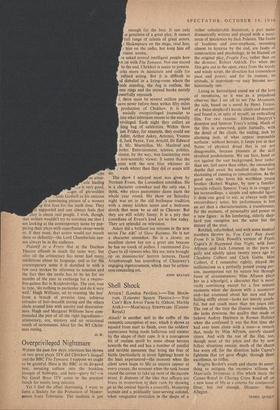Shell Shock
ATTACK! (London Pavilion.)—THE MouN- TAIN. (Leicester Square Theatre.)—You CAN'T RUN AWAY FROM IT. (Odeon, Marble Arch.)---MatesEL4 STRIPTEASE. (Cameo- Royal.) Attack! is another nail in the coffin of the romantic conception of war, which it shows as squalid from start to finish, even the soldiers' appearance being made ludicrous and sinister by the shape of their caps. It is a courageous bit of realism spoilt by some cheap heroics towards the end and has a number of painful and terrible moments that bring the fear of battle (particularly in street fighting) home to the least experienced—the moment when the silent town leaps to life as snipers appear at every cranny, the moment when the tank looms round the corner to take up most of the narrow street. It disposes of the idea that officers are brave in proportion to their rank, by showing j,is as the central figures a cowardly, blustering captain and a, politically time-serving colonel, 'when vengeance overtakes in the shape of a rather unbelievable lieutenant, a part melo- dramatically written and played with a maxi- mum of histrionics by Jack Palance. The faults of loudness and over-emphasis, mounting almost to hysteria by the end, are faults of construction and psychology, to be blamed on the original play, Fragile Fox, rather than on the director, Robert Aldrich. For when the film gets out in the open, away from the wordy and windy script, the direction has tremendous pace and power; and for its content, its attitude, is important—or may become so— historically too.
Living in Switzerland cured me of the love of mountains, so it was as a prejudiced observer that I set off to see The Mountain, the tale, based on a novel by Henri Troyat, of a Swiss shepherd's heroic climb and descent; and found it, in spite of myself, an enthralling film. For two reasons: Edward Dmytryk's direction and Spencer Tracy's acting. Much of the film is concerned, quite factually, with the detail of the climb, the scaling, inch by alarming inch, of what appear impossible surfaces: without heroics, it keeps you in that flutter of physical dread that is yet not disagreeable, because pleasure at the skill involved predominates. We see foot, hand or eye against the vast background, hear rather than see, feel more than either, the resounding depths that await the smallest slip, the least slackening of cunning or concentration. As the good man who loves his worthless young brother (Robert Wagner, by now a familiar juvenile villain), Spencer Tracy is as craggy as his surroundings, a simple and splendid figure it does one good to see; as always with this extraordinary actor, his performance is less an act than a characterisation, a transference, for the moment, of personality and power to a new figure: in his lumbering, elderly shep- herd you recognise not the actor but the stature of the man.
Retitled, refurbished, and with some musical numbers thrown in, You Can't Run Away From It is Dick Powell's version of Frank Capra's 11 Happened One Night, with June Allyson and Jack Lemmon in the parts so gaily and adultly taken twenty years ago by Claudette Colbert and Clark Gable. Miss Colbert, if I remember rightly, played the millionairess as a perfectly poised young per- son, incompetent not by nature but through force of circumstances; Miss Allyson plays her as a schoolgirl, a character that is never really convincing except for a few ecstatic moments when she dances with a scarecrow and—hat crammed about her ears and legs flailing stiffly about—looks not merely youth- ful, but not much more than ten years old. The rest of the time the illusion vanishes, for she lacks dewiness, the quality that made us believe Audrey Hepburn in Roman Holiday when she confessed it was the first time she had ever been alone with a man—a remark that, made by Miss Allyson, merely caused titters. And with the rest of the film, too, though most of the jokes and the by now folksy situations remain, much of the charrn has worn off, for the direction lacks Capra's lightness that yet gave weight, through sheer excellence, to trifles.
Brigitte Bardot's youth and charm do some- thing to mitigate the excessive silliness of vlanfselle Striptease, a film which starts the Cameo-Royal in Charing Cross Road off on a new lease of life as a cinema for continental films: but not enough. Director: Marc Ailegret.
ISABEL QUIGLY


































 Previous page
Previous page